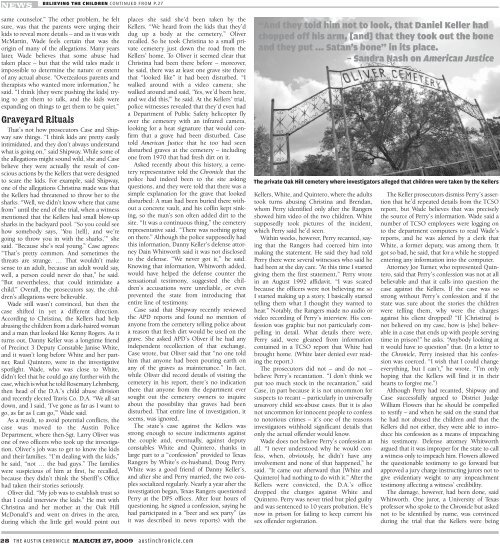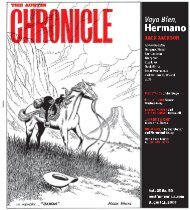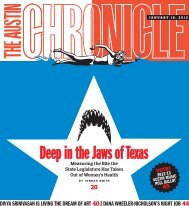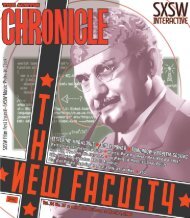March 27, 2009 - The Austin Chronicle
March 27, 2009 - The Austin Chronicle
March 27, 2009 - The Austin Chronicle
You also want an ePaper? Increase the reach of your titles
YUMPU automatically turns print PDFs into web optimized ePapers that Google loves.
NEWSBELIEVING THE CHILDREN CONTINUED FROM P.<strong>27</strong>same counselor.” <strong>The</strong> other problem, he feltsure, was that the parents were urging theirkids to reveal more details – and as it was withMcMartin, Wade feels certain that was theorigin of many of the allegations. Many yearslater, Wade believes that some abuse hadtaken place – but that the wild tales made itimpossible to determine the nature or extentof any actual abuse. “Overzealous parents andtherapists who wanted more information,” hesaid. “I think [they were pushing the kids] tryingto get them to talk, and the kids wereexpanding on things to get them to be quiet.”Graveyard RitualsThat’s not how prosecutors Case and Shipwaysaw things. “I think kids are pretty easilyintimidated, and they don’t always understandwhat is going on,” said Shipway. While some ofthe allegations might sound wild, she and Casebelieve they were actually the result of consciousactions by the Kellers that were designedto scare the kids. For example, said Shipway,one of the allegations Christina made was thatthe Kellers had threatened to throw her to thesharks. “Well, we didn’t know where that camefrom” until the end of the trial, when a witnessmentioned that the Kellers had small blow-upsharks in the backyard pool. “So you could seehow somebody says, ‘You [tell], and we’regoing to throw you in with the sharks,’” shesaid. “Because she’s real young.” Case agrees:“That’s pretty common. And sometimes thethreats are strange. … That wouldn’t makesense to an adult, because an adult would say,well, a person could never do that,” he said.“But nevertheless, that could intimidate achild.” Overall, the prosecutors say, the children’sallegations were believable.Wade still wasn’t convinced, but then thecase shifted in yet a different direction.According to Christina, the Kellers had helpabusing the children from a dark-haired womanand a man that looked like Kenny Rogers. As itturns out, Danny Keller was a longtime friendof Precinct 3 Deputy Constable Janise White,and it wasn’t long before White and her partner,Raul Quintero, were in the investigativespotlight. Wade, who was close to White,didn’t feel that he could go any further with thecase, which is what he told Rosemary Lehmberg,then head of the D.A.’s child abuse divisionand recently elected Travis Co. D.A. “We all satdown, and I said, ‘I’ve gone as far as I want togo, as far as I can go,’” Wade said.As a result, to avoid potential conflicts, thecase was moved to the <strong>Austin</strong> PoliceDepartment, where then-Sgt. Larry Oliver wasone of two officers who took up the investigation.Oliver’s job was to get to know the kidsand their families. “I’m dealing with the kids,”he said, “not … the bad guys.” <strong>The</strong> familieswere suspicious of him at first, he recalled,because they didn’t think the Sheriff’s Officehad taken their stories seriously.Oliver did. “My job was to establish trust sothat I could interview the kids.” He met withChristina and her mother at the Oak HillMcDonald’s and went on drives in the area,during which the little girl would point outplaces she said she’d been taken by theKellers. “We heard from the kids that they’ddug up a body at the cemetery,” Oliverrecalled. So he took Christina to a small privatecemetery just down the road from theKellers’ home. To Oliver it seemed clear thatChristina had been there before – moreover,he said, there was at least one grave site therethat “looked like” it had been disturbed. “Iwalked around with a video camera; shewalked around and said, ‘Yes, we’d been here,and we did this,’” he said. At the Kellers’ trial,police witnesses revealed that they’d even hada Department of Public Safety helicopter flyover the cemetery with an infrared camera,looking for a heat signature that would confirmthat a grave had been disturbed. Casetold American Justice that he too had seendisturbed graves at the cemetery – includingone from 1970 that had fresh dirt on it.Asked recently about this history, a cemeteryrepresentative told the <strong>Chronicle</strong> that thepolice had indeed been to the site askingquestions, and they were told that there was asimple explanation for the grave that lookeddisturbed: A man had been buried there withouta concrete vault, and his coffin kept sinking,so the man’s son often added dirt to thesite. “It was a continuous thing,” the cemeteryrepresentative said. “<strong>The</strong>re was nothing goingon there.” Although the police supposedly hadthis information, Danny Keller’s defense attorneyDain Whitworth said it was not disclosedto the defense. “We never got it,” he said.Knowing that information, Whitworth added,would have helped the defense counter thesensational testimony, suggested the children’saccusations were unreliable, or evenprevented the state from introducing thatentire line of testimony.Case said that Shipway recently reviewedthe APD reports and found no mention ofanyone from the cemetery telling police abouta reason that fresh dirt would be used on thegrave. She asked APD’s Oliver if he had anyindependent recollection of that exchange,Case wrote, but Oliver said that “no one toldhim that anyone had been pouring earth onany of the graves as maintenance.” In fact,while Oliver did record details of visiting thecemetery in his report, there’s no indicationthere that anyone from the department eversought out the cemetery owners to inquireabout the possibility that graves had beendisturbed. That entire line of investigation, itseems, was ignored.<strong>The</strong> state’s case against the Kellers wasstrong enough to secure indictments againstthe couple and, eventually, against deputycon stables White and Quintero, thanks inlarge part to a “confession” provided to TexasRangers by White’s ex-husband, Doug Perry.White was a good friend of Danny Keller’s,and after she and Perry married, the two couplessocialized regularly. Nearly a year after theinvestigation began, Texas Rangers questionedPerry at the DPS offices. After four hours ofquestioning, he signed a confession, saying hehad participated in a “beer and sex party” (asit was described in news reports) with the“And they told him not to look, that Daniel Keller hadchopped off his arm, [and] that they took out the boneand they put … Satan’s bone” in its place.– Sandra Nash on American Justice<strong>The</strong> private Oak Hill cemetery where investigators alleged that children were taken by the KellersKellers, White, and Quintero, where the adultstook turns abusing Christina and Brendan,whom Perry identified only after the Rangersshowed him video of the two children. Whitesupposedly took pictures of the incident,which Perry said he’d seen.Within weeks, however, Perry recanted, sayingthat the Rangers had coerced him intomaking the statement. He said they had toldPerry there were several witnesses who said hehad been at the day care. “At this time I startedgiving them the first statement,” Perry wrotein an August 1992 affidavit. “I was scaredbecause the officers were not believing me soI started making up a story. I basically startedtelling them what I thought they wanted tohear.” Notably, the Rangers made no audio orvideo recording of Perry’s interview. His confessionwas graphic but not particularly compellingin detail. What details there were,Perry said, were gleaned from informationcontained in a TCSO report that White hadbrought home. (White later denied ever readingthe report.)<strong>The</strong> prosecutors did not – and do not –believe Perry’s recantation. “I don’t think weput too much stock in the recantation,” saidCase, in part because it is not uncommon forsuspects to recant – particularly in universallyunsavory child sex-abuse cases. But it is alsonot uncommon for innocent people to confessto notorious crimes – it’s one of the reasonsinvestigators withhold significant details thatonly the actual offender would know.Wade does not believe Perry’s confession atall. “I never understood why he would confess,when, obviously, he didn’t have anyinvolvement and none of that happened,” hesaid. “It came out afterward that [White andQuintero] had nothing to do with it.” After theKellers were convicted, the D.A.’s officedropped the charges against White andQuintero. Perry was never tried but pled guiltyand was sentenced to 10 years probation. He’snow in prison for failing to keep current hissex offender registration.<strong>The</strong> Keller prosecutors dismiss Perry’s assertionthat he’d repeated details from the TCSOreport, but Wade believes that was preciselythe source of Perry’s information. Wade said anumber of TCSO employees were logging onto the department computers to read Wade’sreports, and he was alerted by a clerk thatWhite, a former deputy, was among them. Itgot so bad, he said, that for a while he stoppedentering any information into the computer.Attorney Joe Turner, who represented Quintero,said that Perry’s confession was not at allbelievable and that it calls into question thecase against the Kellers. If the case was sostrong without Perry’s confession and if thestate was sure about the stories the childrenwere telling them, why were the chargesagainst his client dropped? “If [Christina] isnot believed on my case, how is [she] believablein a case that ends up with people servingtime in prison?” he asks. “Anybody looking atit would have to question” that. (In a letter tothe <strong>Chronicle</strong>, Perry insisted that his confessionwas coerced. “I wish that I could changeeverything, but I can’t,” he wrote. “I’m onlyhoping that the Kellers will find it in theirhearts to forgive me.”)Although Perry had recanted, Shipway andCase successfully argued to District JudgeWilliam Flowers that he should be compelledto testify – and when he said on the stand thathe had not abused the children and that theKellers did not either, they were able to introducehis confession as a means of impeachinghis testimony. Defense attorney Whitworthargued that it was improper for the state to calla witness only to impeach him. Flowers allowedthe questionable testimony to go forward butapproved a jury charge instructing jurors not togive evidentiary weight to any impeachmenttestimony affecting a witness’ credibility.<strong>The</strong> damage, however, had been done, saidWhitworth. One juror, a University of Texasprofessor who spoke to the <strong>Chronicle</strong> but askednot to be identified by name, was convincedduring the trial that the Kellers were being28 T H E A U S T I N C H R O N I C L E MARCH <strong>27</strong>, <strong>2009</strong> a u s t i n c h r o n i c l e . c o m

















